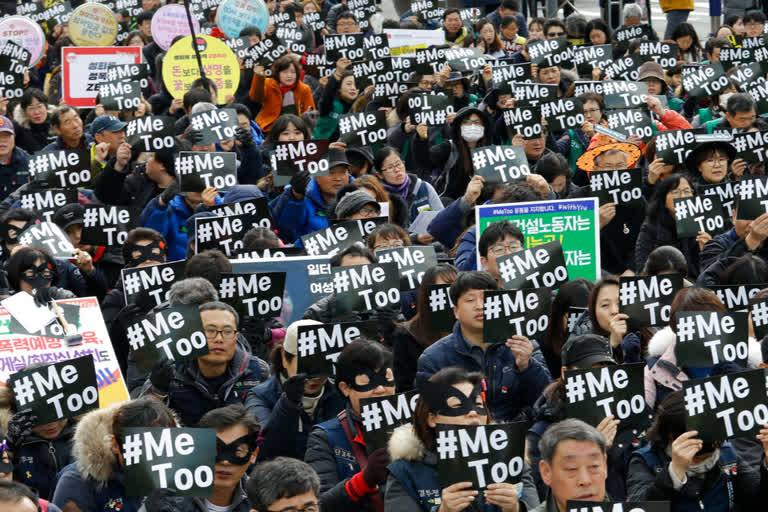Seoul:As South Korea enters a bitter presidential race, Hong Hee-jin is one of many young women who feel that the country's politics has become dominated by discrimination against women, even outright misogyny.
"Women are being treated like they don't even have voting rights," the 27-year-old office worker in the capital, Seoul, said.
For years, South Korean women have made slow but steady progress in the workplace as they confronted an entrenched culture of male chauvinism and harassment. But this extremely tight presidential race, which culminates March 9, has exposed the fragility of what's been won.
Top conservative candidate Yoon Suk Yeol and his liberal rival Lee Jae-myung — both men above 55 — are fighting for what they see as a "male" vote crucial for victory. They have increasingly focused their messages on young men who decry gender equality policies and the loss of traditional privileges in a hyper-competitive job market. "Politicians are taking the easy path," Hong said. "Instead of coming up with real policies to solve problems facing young people, they are fanning gender conflicts, telling men in their 20s that their difficulties stem from women receiving too many benefits."
The tensions can be seen on the streets. Hundreds of women have marched in protest against the "election of misogyny." Small but vocal groups of anti-feminist men have staged rallies in response. Divisive gender politics has grown as South Korea deals with a fast-aging population, a plummeting birth rate, soaring personal debt, a decaying job market and stark inequality. There's also the growing nuclear threat from North Korea and fears of being squeezed in the confrontation between the United States and China.
No campaign issue, however, has caused more debate than Yoon's vow to abolish the Ministry of Gender Equality and Family, which the candidate says promotes policies unfair to men. A former prosecutor general, Yoon, 61, has also vowed stronger penalties for false sexual crime reports. Critics say this makes up only a small number of rape claims, and that the threat of tougher punishment could intimidate victims from coming forward amid a recent male backlash against the #MeToo movement.
Liberal ruling party candidate Lee, 57, has taken a cautious approach to gender issues, while clashing with Yoon over the economy and North Korea policy. Narrowly trailing Yoon in the polls, Lee has faced calls to appeal to more young men, whose support of conservative candidates in mayoral by-elections in Seoul and Busan may have led to a shocking double-defeat for the liberals. Lee has described gender tensions as related to joblessness and says men shouldn't be discriminated against. He said he plans to keep the gender ministry, but under a different Korean name that no longer includes the word "women."
Yoon's campaign has been influenced by his party's chairman, Lee Jun-seok, a 36-year-old Harvard-educated "men's rights" advocate who describes hiring targets for women and other gender equality policies as "reverse discrimination." Lee calls feminist politics "blowfish poison." Yoon during a presidential debate on Monday repeated an argument that South Korea no longer has any structural barriers to women's success, saying discrimination is now about "individual versus individual."
The World Economic Forum ranks South Korea 102 out of 156 nations in an index that examines gender gaps in jobs, education, health and political representation.
South Korea has by far the largest gender pay gap among developed economies at around 32%, according to the Paris-based Organization for Economic Cooperation and Development, and women remain significantly underrepresented in corporate boardrooms and politics. The country's record-low birth rate underscores how many women find it impossible to combine careers and family. Scrapping the gender ministry could weaken women's rights and "take a toll on democracy," said Chung Hyun-back, a scholar who served as gender equality minister in 2017-18, under current liberal President Moon Jae-in. It is also a key government department committed to helping single parents, sexual abuse survivors and the families of minorities and migrants.
The prospect frustrates Kang Ji-woo, a 36-year-old single mother who once struggled to find a job in a deeply conservative society and who receives child care support from the gender ministry. Unwed mothers in South Korea are sometimes pressured and shamed into having abortions or relinquishing their children for adoption.
